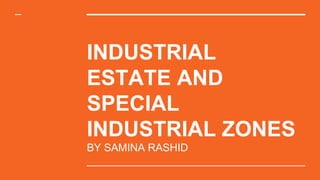Industrial estate and special industrial zones
•Download as PPTX, PDF•
0 likes•110 views
Industrial estate and special industrial zones
Report
Share
Report
Share

Recommended
More Related Content
What's hot
What's hot (11)
Presentation on Study of Unorganized Cottage Industries

Presentation on Study of Unorganized Cottage Industries
Similar to Industrial estate and special industrial zones
Similar to Industrial estate and special industrial zones (20)
sectorsofindianeconomy-150208103416-conversion-gate02 (1).doc

sectorsofindianeconomy-150208103416-conversion-gate02 (1).doc
Chapter - 2, Sectors of the Indian Economy, Economics, Social Science, Class 10

Chapter - 2, Sectors of the Indian Economy, Economics, Social Science, Class 10
IRJET - Need of Encouraging Urban Employment and Earnings of Informal Sector

IRJET - Need of Encouraging Urban Employment and Earnings of Informal Sector
Industrial Policy - 1948, 1956, 1973, 1977, 1980, 1991

Industrial Policy - 1948, 1956, 1973, 1977, 1980, 1991
Recently uploaded
Recently uploaded (10)
Indian Economy: The Challenge Ahead Since India gained

Indian Economy: The Challenge Ahead Since India gained
Textile Waste In India/managing-textile-waste-in-India

Textile Waste In India/managing-textile-waste-in-India
Top^Clinic ^%[+27785538335__Safe*Women's clinic//Abortion Pills In Musina

Top^Clinic ^%[+27785538335__Safe*Women's clinic//Abortion Pills In Musina
Industrial estate and special industrial zones
- 1. INDUSTRIAL ESTATE AND SPECIAL INDUSTRIAL ZONES BY SAMINA RASHID
- 2. Industrial Estate: Industrial Estates are specific areas reserved for industry only. The government provides infrastructure facilities such as metalled roads, electricity, water, gas, hospitals and sanitation facilities. Pakistan's first industrial estate Sindh Industrial Trading Estate Limited (S.I.T.E) Karachi was established in 1947.
- 3. SPECIAL INDUSTRIAL ZONES Special industrial zones can be developed even in areas where infrastructure facilities like water supply, electricity, telephone and metalled roads are not available. The interested companies (local or foreign investors) would develop these facilities and provide utilities for the zones, however, they will be assisted by the respective government agencies to provide public facilities e.g. telephone, electricity and water supply, metalled roads. The investors will be allowed to develop their residential, commercial and social facilities in the vicinity of the industrial zone.
- 4. What is the Difference Between Formal and Informal Sectors? The formal sector consists of the businesses, enterprises and economic activities that are monitored, protected and taxed by the government, whereas the informal sector is comprised of the workers and enterprises that are not under government regulation. British anthropologist Keith Hart coined the term "informal sector" in 1973 as part of a study on Ghana. There are many conflicting theories as to the role and benefits of the informal sector. In contrast to the formal sector, the laborers, businesses and activities that make up the informal sector are not registered with or taxed by the government. For this reason, scholars sometimes refer to the informal sector as the black market, shadow economy or underground economy. Originally, the term referred to self-employed small enterprises like street vending, sewing, artisanry and small farming. It now also includes wage-earning jobs like crop-harvesting, cleaning and any other unprotected occupation.
- 5. FORMAL SECTOR INFORMAL SECTOR Employed by institution. Self employment. Capital intensive with few workers. Generally mechanized. Labour intensive using mainly hand tools. Very few modern machines are used. Regular working hours and certain wages. Irregular working hours and uncertain wages. Relatively guaranteed standard in quality of goods. Often low standard in quality of goods. Legal and registered. Non-registered. Work is located in office or factories. Work done at home or on the streets.
- 6. Supermarket; an example of formal sector.
- 7. An example of informal sector.